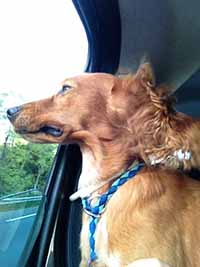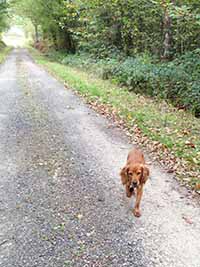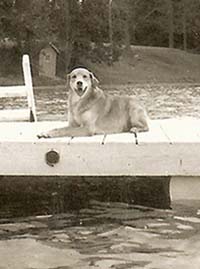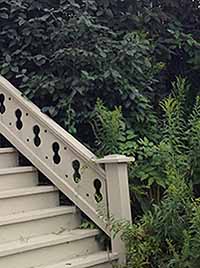The Good Life
I cleared out the fridge, making swift decisions about what to pack in the cooler, what to discard because it wouldn’t travel and wouldn’t last until our return. I’d packed three small suitcases the night before – we keep a set of clothes at the country house so we don’t need to take much – and created the shopping bag stuffed with things to take with us: the rug that doesn’t quite work in our living room, an old lamp, and some worn clothes being retired to the country house wardrobes. I thought I’d gotten a head start, but as usual, I found myself scrambling at the end, rushing around pulling things together when we wanted to have left Barcelona an hour before.
De-facto commanded Short-pants to help him carry the bags down to the rental car, while Buddy-roo occupied the dog, who was suddenly very  nervous, seeing all the activity. Did he know what was going on? Did he see all the bags and think we were leaving him? Did he sense our mild stress, always present at the moment of departure? What do dogs think? Now that we have one, I wonder about this.
nervous, seeing all the activity. Did he know what was going on? Did he see all the bags and think we were leaving him? Did he sense our mild stress, always present at the moment of departure? What do dogs think? Now that we have one, I wonder about this.
A final sweep of the house to make sure the lights were off and the windows locked, and we all piled in the car – the dog, too – and headed north to France. Winston stepped around and on top of the girls in the back seat, unsure of whether to burrow himself between the two of them or take advantage of the view out the window. A few barks to express his excitement, or consternation – what was he thinking? – before he settled in as the car sped along, leaving the light city traffic for the open highway.
We’ve passed the 3-week trial period designated by the animal rescue center, so there’s no turning back. There have been moments when I wanted to march Winston up the hill to those dog pens and hand him over. The initial chewing incident was an anomaly and he hasn’t ruined any of our clothes or furniture, but his digestive tract has been in adjustment mode. Probably we changed his food too drastically or else just from the change in general, so he left us some presents in the mornings that weren’t particularly pleasant to discover, or to clean up. At least the mess was on the floor, and not on a rug or on the furniture. I’d like to think he did this in desperation, not as a mean-spirited gesture. I used to have a cat that deliberately avoided her litter-box when she was mad at me for traveling. She did her business by the door instead, and it wasn’t fun to come home to.
~ ~ ~
Winston is folding into our family. He’s not nervous anymore. His barking has diminished. He heels more often, though not reliably. He’s a good dog, even if he is a bit cheeky, sneaking in the kitchen though it’s forbidden, nosing into the bathroom if someone leaves the door open. You know, doing doggie things.

In the country he was liberated. As far as possible from the caged life at the rescue center, he was completely free. He could come and go from the house as he pleased, without a leash, to explore the woods and fields around our property. There were new smells to sniff at, green ones, strong and natural. There was tall grass to run in and dirt tracks to run along. We were cautious at first, wondering if he’d run away or get hit by a car. But he strayed only far enough to explore, and managed to avoid the occasional traffic that passes on our road. The best part, though, was taking him out for a run.
Winston would trot beside me, his ears flopping wildly until he stopped to sniff in a ditch or a fencepost. He’d root around and eventually lift his leg to leave a calling card before looking up to see I was ahead of him. He’d sprint to catch up and pass me, running ahead with glee until some other scent would capture his attention and he’d fall to the side of the road to investigate, relieve himself once more before sprinting up to catch me again. Biking with Winston was even better: he’d hit full throttle to overtake us on our bicycles, his nose jutting forward, all four legs stretched in a fully extended stride. After a week I noticed three things: Winston didn’t smell like a city dog anymore. Winston got stronger and more muscled. Winston seemed really, truly, happy.
I grew up with a dog. He was part of our family before I was even born. Bum – yes, that was his name – was a mutt, a variation of golden retriever mixed with who-knows-what. My father called him a woodchuck hound, because he liked to hunt them down and return home triumphantly with the small dead animal clutched in his jaw. Owning a dog when you live in the country is relatively fuss-free. We never had to put Bum on a leash, take him for a walk or carry plastic bags to pick up after him.  He’d scratch at the door to go out, and then again to come back in. (In a renovation years after the dog had died, my father refused to replace the doors because Bum’s nail marks were, as he put it, part of this history of the house.) Dogs belong in the country, I’ve always thought, not cooped up in a city apartment. And yet now we have a dog, and we live in an apartment. I suppose it’s better for him than being cooped up in a cage at the pound, or with a family that can no longer care for him, but this week reminded me why I haven’t owned a dog my entire adult life, up until now. A dog’s life is so much better in the country.
He’d scratch at the door to go out, and then again to come back in. (In a renovation years after the dog had died, my father refused to replace the doors because Bum’s nail marks were, as he put it, part of this history of the house.) Dogs belong in the country, I’ve always thought, not cooped up in a city apartment. And yet now we have a dog, and we live in an apartment. I suppose it’s better for him than being cooped up in a cage at the pound, or with a family that can no longer care for him, but this week reminded me why I haven’t owned a dog my entire adult life, up until now. A dog’s life is so much better in the country.
If fact, I think Winston found his footing within our family because we took him to the country. We gave him freedom, with a measure of safety, and he started to trust us. Maybe it would have happened anyway, over time, but being in that environment accelerated the bonding process. He’s really part of the family now. He seems to like us. And he’s absolutely nuzzled his way into our hearts.
~ ~ ~
The closing up of the country house is a series of rituals. I clean out the fridge, stow all the counter-top appliances and utensils behind closed cupboards, put away the good pillows and bed linens, and sweep and vacuum to put the place in some semblance of clean, knowing that dust and cobwebs will begin to accumulate the moment we leave. De-facto locks all the exterior doors and drains the toilets and the water heater, shuts off the water. Last one out flips the electricity switch before securing the door. The house always looks sad, standing dark and lonely as we drive away.
This time, our departure reminded me of a moment on last summer’s trip when we visited my hometown. It was a quick stop, just one overnight, enough time to see a few friends, visit my parents’ gravesite and drive up the hill to see the house that was my childhood home. We sold it three years ago, but the new owners have already put it back on the market. Too much work and expense to keep it up, that’s the rumor. Now it stands empty, void of furniture and family. The row of short bushes around the front porch, kept in check by the gardener my mother employed and befriended, sprawl uneven and overgrown, the shrubs beside the back stairs are fast becoming a  wild thicket, the peony bushes in the side yard flattened by the weight of the dead blooms that hadn’t been pruned. It broke my heart to see my old house like this, cold on the inside, untended on the outside.
wild thicket, the peony bushes in the side yard flattened by the weight of the dead blooms that hadn’t been pruned. It broke my heart to see my old house like this, cold on the inside, untended on the outside.
Across the street, another lonely house. Once the home of a family with five boys – my first childhood playmates – now not even a carpet remains inside. I’d heard these neighbors were planning to move but I hadn’t prepared myself to see their house emptied of all its belongings. We stood on the cement porch, pressing our faces up to the windows, cupping our hands around our eyes to see into the rooms I hadn’t thought about in years. A living room once filled with books and a framed print of the mysterious (to me) Peaceable Kingdom, a kitchen that always smelled of fresh baked brownies – we used to pull out the pots and pans from the corner cupboard and turn the lazy-susan inside it into an amusement park ride – the playroom where I spent many afternoons until my mother called from across the road to come home for dinner.
Two old houses, longtime friends like the families that lived within them, now stand across from each other, hollowed out. There is no life inside them, only memories, and only a handful of us who remember. As we drove away, tears were unavoidable. Tears for the people who are gone. Tears for those empty houses that for so many years knew warmth and laughter and the vibration of the good life within them. Now their windows are blank, like wide eyes staring across the street at each other in disbelief.
There were once doggies living in those old country houses. I remember Windy, a feisty black and white Boston Terrier skittering around on the neighbor’s cement porch. And our Bum, who occasionally crossed the road to sniff at Windy before running off to the apple orchard to hunt down an errant woodchuck. Those dogs had it all, living free and unfettered in big rambling houses with loving families and fresh country air. That’s the good life, for a dog. Winston got his taste of it, but now he’s back to being a city dog again, lying on his blanket on the couch until one of us picks up his leash to take him for walk or, if he’s lucky, a run up to the carretera on the mountain behind us. I bet he misses the good life of the country. I know I do. It’s a good life for humans, too.